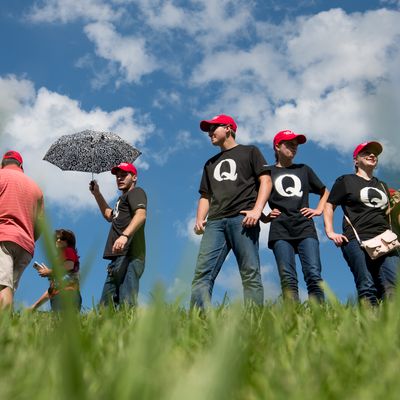
The subject matter of QAnon — the conspiracy theory painting Trump as the last line of defense between American ideals and the foul intentions of deep-state agitators and Democratic pedophiles — has been widely remarked upon as a sign of how thoroughly misinformation has been accepted among far-right supporters of the president. What is still emerging is the scale of the conspiracy reportedly considered a domestic terror threat by the FBI. On Monday, a report from NBC News helped bring that question into focus.
According to an internal Facebook audit obtained by the network, QAnon groups on the social-media platform have millions of members. “The top 10 groups identified in the investigation collectively contain more than 1 million members, with totals from more top groups and pages pushing the number of members and followers past 3 million,” NBC News reports, adding the important caveat that it’s not clear “how much overlap there is among the groups.” The number of users engaged in groups related to the conspiracy has not previously been documented by any outside count because they are largely private.
According to two employees who spoke with NBC News, the information-gathering is part of an investigation that could determine if Facebook will take any action to limit its QAnon users. Last month, the social-media giant said that it was looking at the conspiracy as part of a larger inquiry into groups with possible ties to violence. (Since last March, QAnon supporters have been involved in a high-profile murder in Staten Island, an arrest on charges of terrorism, an attempt to assassinate Joe Biden, and at least two kidnappings.) If Facebook chooses to act, NBC News reports that it may be similar to “its handling of anti-vaccination content, which is to reject advertising and exclude QAnon groups and pages from search results and recommendations, an action that would reduce the community’s visibility.”
Facebook isn’t the only tech leader currently grappling with how to handle its Q community, which is now in its third year of guesswork. (Like millenarian groups of yore, the conspiracy is able to adapt to new information as old predictions from its anonymous leader prove shortsighted.) In July, Twitter banned thousands of QAnon accounts due to their “potential to lead to offline harm,” while TikTok began blocking hashtag searchers of the conspiracy. On the same day as the Facebook report, Google announced it would block shopping searches related to the conspiracy, saying that the search engine does not condone “products that promote hatred, intolerance, discrimination or violence against others.” Meanwhile, Q — the source of information for the loose-knit group who claims he is in the Trump administration — has asked members to take a public oath in support of the movement. Among those who took the pledge was former Trump national security adviser Michael Flynn.
Perhaps a more telling sign of the increasing popularity of the conspiracy are the candidates in its sphere of influence that may soon be entering the halls of Congress. Last month, Republican Lauren Boebert won her primary in Colorado’s rural Third District, and has said that from “everything that I’ve heard of Q, I hope that this is real.” On Tuesday, the conspiracy may get its first guaranteed Congress seat if front-runner Marjorie Taylor Greene wins the Republican primary in Georgia’s deep-red 14th District. “Q is a patriot,” Greene said in the early days of the conspiracy in 2017. “He is someone that very much loves his country, and he’s on the same page as us, and he is very pro-Trump.”






























